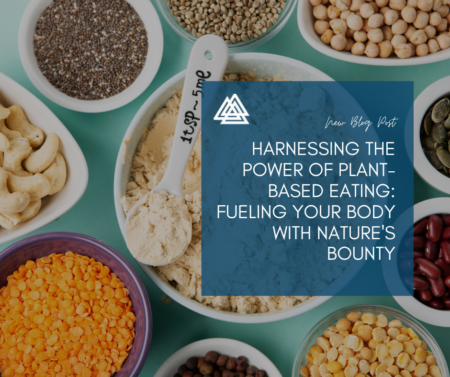 Plant-based eating has emerged as a prominent wellness trend, celebrated for its potential health benefits and positive impact on the planet. By prioritizing whole, plant-based foods and minimizing or eliminating animal products, individuals can nourish their bodies with nutrient-dense foods while supporting environmental sustainability. In this blog post, we’ll explore the principles of plant-based eating, its potential health benefits, and practical tips for adopting a plant-based lifestyle.
Plant-based eating has emerged as a prominent wellness trend, celebrated for its potential health benefits and positive impact on the planet. By prioritizing whole, plant-based foods and minimizing or eliminating animal products, individuals can nourish their bodies with nutrient-dense foods while supporting environmental sustainability. In this blog post, we’ll explore the principles of plant-based eating, its potential health benefits, and practical tips for adopting a plant-based lifestyle.
Plant-based eating involves consuming predominantly or exclusively foods derived from plants. This diet typically includes fruits, vegetables, grains, legumes, nuts, and seeds, while minimizing or entirely excluding animal products such as meat, dairy, eggs, and honey.
Here are some key aspects of plant-based eating:
-
- Fruits and Vegetables: These form the foundation of a plant-based diet, providing essential vitamins, minerals, and antioxidants.
- Whole Grains: Whole grains like quinoa, brown rice, oats, and barley are rich in fiber, complex carbohydrates, and various nutrients.
- Legumes: Beans, lentils, chickpeas, and other legumes are excellent sources of protein, fiber, and micronutrients.
- Nuts and Seeds: These are good sources of healthy fats, protein, and various nutrients. Examples include almonds, walnuts, chia seeds, and flaxseeds.
- Plant Oils: Healthy plant-based oils like olive oil, avocado oil, and coconut oil can be used for cooking and dressing.
- Plant-based Proteins: Tofu, tempeh, seitan, and plant-based meat substitutes are options for those seeking alternatives to animal protein.
- Dairy Alternatives: Milk, cheese, yogurt, and other dairy products can be replaced with plant-based alternatives such as almond milk, soy yogurt, and cashew cheese.
- Eggs and Honey Alternatives: For those following a strict plant-based diet, eggs can be substituted with products like tofu scramble or chickpea flour-based omelets. Honey can be replaced with alternatives like maple syrup, agave nectar, or date syrup.
Plant-based eating is associated with various health benefits, including reduced risk of chronic diseases such as heart disease, diabetes, and certain cancers. It is also more environmentally sustainable and ethical compared to diets high in animal products, as it requires fewer resources and reduces greenhouse gas emissions.
However, it’s essential to ensure a well-balanced diet when adopting a plant-based lifestyle to meet all nutritional needs, including protein, iron, calcium, vitamin B12, and omega-3 fatty acids. Consulting with a healthcare professional or registered dietitian can help individuals plan a nutritionally adequate plant-based diet.
